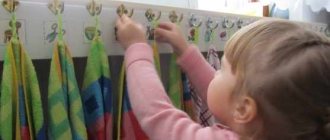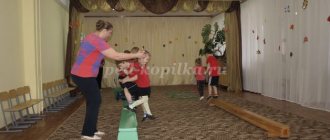Card index of games for emotional development in the middle group
Inna Likhacheva
Card index of games for emotional development in the middle group
"Training emotions "
teaches you to understand the emotions of others , express your own emotions , feelings and their shades.
Joy. Please smile like: a cat in the sun; the sun itself; sly Fox; happy child; happy mom.
Anger. Show how angry you were: a child whose toy was taken away; Pinocchio when Malvina punished him; two sheep on the bridge.
Fright. Show how scared you were: the hare who saw the wolf; a kitten at which a dog barks.
"Mood Lotto"
develops the ability to understand the emotions of other people and express one's own emotions .
Schematic images of emotions face on the table . The child takes one card and , without showing it to anyone, depicts it using facial expressions, pantomimes, and voice intonations. The rest guess the depicted emotion .
"Go away, anger, go away"
Target. Learning to express negative emotions , developing the skill of regulating the emotional state .
The child lies down on the carpet, with pillows around him. Closing their eyes, they begin to beat their feet on the floor with all their strength, and their hands on the pillows and shout loudly: “Go away, anger, go away!”
After three minutes, at the adult’s signal, the children lie down in the star position, with their arms and legs spread wide, and lie quietly, listening to calm music.
Game "Continue the Phrase"
Target. Developing the ability to express one's own emotions .
Children pass the ball around in a circle, while continuing the phrase, telling when and in what situation it happens like this: “I rejoice when...”
,
“I get angry when...”
,
“I get upset when...”
,
“I get offended when...”
,
“I get sad when...”
, etc.
Game "Name Calling"
Target. Discharging negative emotions in an acceptable form using verbal means .
Children pass the ball around in a circle, while calling each other different harmless words. These can be (by agreement with the group )
names of trees, fruits, furniture, mushrooms, vegetables, etc. Each appeal must begin with the words
“And you.”
and accompanied by a glance at the partner. For example:
“And you are a carrot!”
.
In the final circle, the players must say something nice to their neighbor, for example: “And you are the sun!”
After completing the last round, it is necessary to discuss what was more pleasant to listen to and why.
Pillow Fight Game
Target. Reducing emotional and muscle tension.
Children, at the command of the leader, begin the battle - “the battle of two tribes”
,
“Here’s to you.”
or others. The players hit each other with pillows, emitting victory cries, trying to hit different parts of the body.
An adult can start the game to lift the ban on aggressive actions. You should agree in advance with the children that immediately after the signal (bell, clap, etc.)
the game stops.
children in . Avoid excessive emotional arousal .
Game "Unusual Battle"
Target. Reducing emotional and muscle tension.
Children, at the command of the leader, begin an “unusual battle”
. The players tear up newsprint and throw them at each other, uttering cries of victory, trying to hit different parts of the body.
Game "Repeat the movements"
Goal: developing the ability to control one’s actions, subordinating the instructions of an adult.
A child, listening to an adult, must perform movements; if he hears the name of a toy, he must clap, if the name of a dish is called, he must stomp, if he hears the name of a piece of clothing, he must sit down.
Game “An hour of silence - an hour is possible”
Target. Developing the ability to regulate one’s state and behavior.
Agree with your child that sometimes, when you are tired and want to rest, there will be an hour of silence in the house. The child should behave quietly, play calmly, draw, and design. But sometimes you will have an hour of "maybe"
when the child is allowed to do everything: jump, scream, take mother’s clothes and father’s instruments, hug parents, hang on them, ask questions, etc. These hours can be alternated, they can be arranged on different days, the main thing is that they become familiar in the family .
Game "Silence"
Target. Developing the ability to control your emotions and manage your behavior.
The players sit in a circle and are silent; they should neither move nor talk. The driver walks in a circle, asks questions, performs ridiculous movements. Those sitting must repeat everything he does, but without laughter or words. Whoever breaks the rules drives.
Game "YES and NO"
Target. Developing the ability to control impulsive actions.
When answering questions the words “YES”
and
“NO”
cannot be said. Any other answers can be used.
Are you a girl? Is the salt sweet?
Birds are flying? Do geese meow?
Is it winter now? Is a cat a bird?
Is the ball square? Does a fur coat keep you warm in winter?
Do you have a nose? Are the toys alive?
Game "Speak"
Target. Developing the ability to control impulsive actions.
The presenter says: “I will ask you questions, simple and complex. But it will be possible to answer them only when I give the command “Speak.” Let’s practice: “What time of year is it now?” (pauses)
- Speak. What color are the curtains in our room? Speak. What day of the week is it today? Speak. ""









